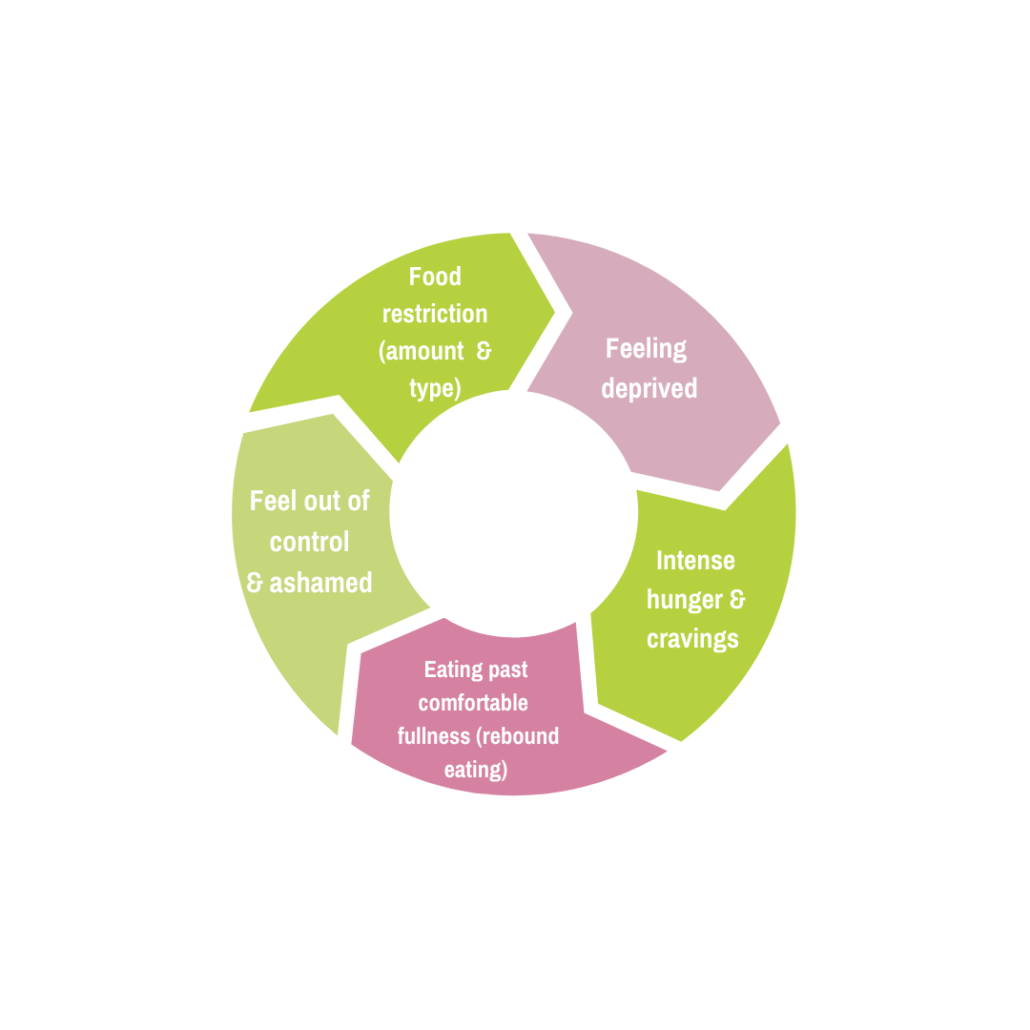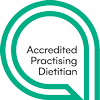Honour your hunger
This is the second post in a 10-part series looking at the principles of Intuitive Eating. The previous post was on Reject the diet mentality.
Diet culture has done a great job of making us believe we can’t trust our bodies to let us know when we need to eat. It portrays hunger as something negative, something we should ignore or overcome, when in reality, hunger is your body’s way of communicating a basic need of survival. And not honouring it can leave a lasting mark on our relationship with food and our bodies.
In this blog, I’m sharing some tips on how to start truly honouring your hunger, but first a few truth bombs!
A dieting body is a starving body
That might sound a little extreme. Afterall, a dieting body does not necessarily look like a starving body. But the symptoms of chronic dieting closely resemble those that occur during starvation.
A landmark study – The Minnesota Starvation Experiment in 1944-1945 – teaches us a lot about what happens when we don’t honour our hunger by eating enough to meet our body’s needs. The study enrolled 36 conscientious objectors during World War II with the aim of finding out how to help people affected by famine and starvation during the war safely recover from starvation. You can find out more about the trial here and here.
The physically and mentally healthy young adult men were put on a semi-starvation diet (about 1600 calories per day, roughly half of the men’s usual food intake) for six months. This calorie intake, by the way, is the modern equivalent to a weight reduction diet for men.
The results of the trial were revealing. As well as experiencing profound physical changes, such as lack of energy and extreme hunger, the men also experienced mood changes, an intense preoccupation with food and heightened food cravings. At the end of the semi-starvation period, when food was made available again, their hunger appeared to be insatiable and they started to show binge-eating behaviours. In spite of being able to eat as much as they wanted, some men developed a fear about food not being available. It took several months for most men to recover, and some never did.
Notice how the effects of this semi-starvation trial are startlingly similar to the symptoms of chronic dieting? Many clients – when hearing about this study- are struck by how similar their own experiences of dieting are to those of the men that took part in this trial.
Hunger is not down to a lack of willpower
If you have ever experienced being ravenously hungry, you might have noticed that when you experience this kind of hunger, it’s nearly impossible to eat in a way that is mindful and pleasurable. And you’re more likely to make impulsive food choices when you are ravenously hungry. What you might not know though, is that eating this way is not down to willpower, it’s down to biology. In fact, even non-dieters will eat past comfortable fullness if they get too hungry.
Eating past comfortable fullness, binging, intense food cravings, and feeling out of control around food is not about a lack of willpower. It’s often because you have been ignoring your biological hunger and not eating enough. The more you deny and ignore your biological hunger, the more intense your food cravings and obsessions become. Eventually, you eat past comfortable fullness. We can think of this kind of urgent hunger as “primal hunger”. Our need for energy in the form of food is so essential that if we aren’t getting enough, our brain responds by stepping up our drive to eat via a complex series of biological, hormonal and psychological mechanisms. Put simply, when food is restricted (for whatever reason), our brain works to help us survive the food restriction by increasing our drive to eat through various mechanisms. This also helps explain why, when we experience primal hunger, eating feels so intense and out of control and why we are more likely to eat past comfortable fullness. Apart from not feeling good, when this happens, it also reinforces our belief that we can’t be trusted with food and we feel guilt and shame. We believe (incorrectly) that we need to restrict what we eat again, setting us up once more for intense hunger and cravings. We can imagine this looking like the cycle pictured below.
Food insecurity or food scarcity is a kind of trauma
Again, this might sound a little extreme, but as we’ve seen from the Minnesota Starvation Experiment, any kind of food restriction* creates a sense of scarcity that leaves a mark on our relationship with food. Experiencing primal hunger can lead to people being so frightened of feeling hunger that it even prevents them from experiencing and therefore knowing what gentle hunger feels like for them.
* Some people need to restrict certain foods for medical reasons like a food allergy or coeliac disease.
Some people don’t feel hunger anymore
Some people don’t feel hunger anymore. This can happen for many reasons, including:
- Using calorie-free beverages to “trick” your stomach into feeling full. Over time hunger signals grow weak.
- Denying your hunger signals (i.e. dieting) for example thinking “I can’t possibly be hungry, I just ate two hours ago” or “I’m hungry, but I’m not allowed to eat until 12pm.” When you deny your hunger signals long enough, your body will eventually stop sending them.
- A chaotic life. It’s easy to ignore hunger when life is chaotic. Over time, it can become hard to notice hunger – even when life is calmer. Similarly, if you have a history of trauma, you may find it hard to feel hunger, because you need to feel safe in order to feel hunger.
- Skipping breakfast. Some people skip breakfast because they believe they feel less hunger the rest of the day. But often, this leads to eating past comfortable fullness, typically in the evening (and respond by not eating breakfast the next day so the cycle repeats itself again and again).
- The biological cascade of stress hormones and neurotransmitters in the body can blunt feelings of hunger.
- Lack of self-care. When your basic needs e.g. for sleep and downtime aren’t being met, this can prevent you from tuning into the cues – including your hunger cues – your body is sending you.
Other reasons why you may not feel hungry include excessive exercise, illness, grief, side-effects of certain medications and more.
If you don’t feel hunger, it’s important to know that this doesn’t mean your body isn’t hungry. Your body still needs fuel.
The way to get your hunger signals back “online” is eating consistent meals and snacks, even if you don’t feel hunger cues.
How do you actually start honouring your hunger?
The first step is understanding that your body has a biological need for food and energy, and that ignoring this need can have negative physical and psychological consequences, like the ones mentioned above. Your brain and body need to know that they are not going to be deprived of food on a regular basis. This means making sure you’re eating enough and consistently (using the general guideline to eat every 3-4 hours during waking hours). This also means including carbohydrate-containing foods. Ever notice that when you’re really hungry or you’re craving foods, you go for foods like bread, pasta, chocolate, lolllies, ice cream, chips and fries? That’s because they contain carbohydrate, which your body is craving. There’s also a biological reason for that: carbohydrates are the preferred source of energy and fuel for our brain and muscles.
Second, start listening and increasing your awareness of your hunger signals. When you eat, try asking yourself, “Am I hungry? What’s my hunger level?” OR “When was the last time I ever felt hungry? How does my stomach feel?
Keep in mind that hunger signals are not just limited to a gurling or growling noises in your stomach, but can also include:
- Light-headedness
- Difficulty concentrating
- Irritability
- Feeling faint
- Headache
- Thoughts of and thinking of food and more.
Hunger signals are also individual. The way you experience hunger will likely be different to the way a friend or someone close to you experiences hunger.
Honour your hunger doesn’t ONLY mean eating when you are hungry
Intuitive Eating is about ditching the rules, so please don’t interpret “Honour your hunger” as meaning you can ONLY eat when you are hungry! “Honour your hunger” isn’t intended to be a rule. Intuitive Eating recognises that there are plenty of situations when we want and need to eat for reasons other than physical hunger. For example:
- When you’re at a friend’s birthday party or a wedding and they’re serving cake. You might not be physically hungry, but you would like to enjoy a slice of cake and help your friend celebrate.
- You have a busy afternoon ahead of you. Even though you aren’t hungry, you know it’s this is your last chance to eat for a while, and you know that if you don’t eat now, you will likely become very hungry when you don’t eat. You can think of this as self-care.
Short and sweet
When we don’t provide our body with adequate energy in the form of food – including carbohydrates – it can lead to primal hunger. When we reach the point of primal hunger, it’s no longer possible to eat in a way that is mindful and enjoyable and often leads to eating past uncomfortable fullness. You will have a more peaceful eating experience if you honour your hunger before it becomes primal. Starting to listen to and honoring your body’s early, more subtle and gentle hunger signals is the first step in getting off the deprivation-guilt cycle, trusting your body around food, and allowing eating to become a more peaceful experience. Try to approach honouring your hunger with patience, compassion, and non-judgmental curiosity. It’s not something that will happen overnight, especially if you’re been dieting and food restricting for some time!
Ready to take the next step? Contact me and request a complimentary call to find out more about Intuitive Eating and how it can help you truly nourish yourself – body, mind and soul.






